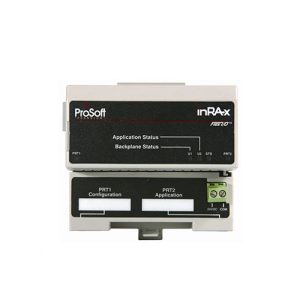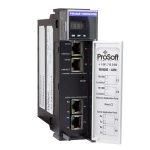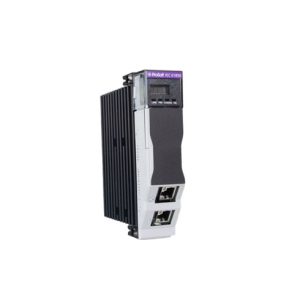Description
‘C’ Programmable Application Development Module for FLEX I/O
The MVI94 Application Development Module is a FLEX backplane compatible module that allows user-developed ‘C’ applications to operate on the FLEX platform. A great way to speed up custom ASCII data communications or to protect a proprietary algorithm, the ADM is a powerful tool for the FLEX platform.
Features and Benefits
Powerful platform for developing and running ‘C’ applications on Rockwell Automation’s FLEX I/O processors. The MVI94-ADM module is a single slot, backplane compatible solution for the Rockwell Automation FLEX I/O and Integra I/O platforms. This module is a powerful and programmable solution supporting two fully isolated serial ports allowing serial field devices to be integrated into the FLEX platforms.
The MVI94-ADM module has two serial ports, both of which are isolated for field interfaces:
- PRT1 Application/Debug/Config RS-232
- PRT2 Application RS-232, RS-422 or RS-485
PRT2 is jumper configured for direct or multi-drop field communication. The application program can be written to control the two application ports independently, allowing maximum flexibility in the design.
Applications
The MVI94-ADM module is the ideal solution for many applications where serial connectivity must be added to a FLEX platform. Applications using the MVI94-ADM module include:
- Bar code scanner interface
- Legacy ASCII protocol connections
- Terminal port emulation
- Printer driver (Alarm/status printer)
- Customized protocol implementations
Specifications
DF1 ports
- Full and half duplex modes supported
- CRC and BCC error checking
- Memory usage is completely user configurable, supporting the storage and transfer of up to 4000 registers to/from the control processor
- 125 word read and write command lengths supported
- Floating point data movement supported
DF1 Master Protocol Specifications
The port on the DF1 module can be configured as a Master port. When configured in master mode, the DFCM module is capable of reading and writing data to remote DF1 devices, enabling the Flex platform to act as a SCADA sub-master.
- Command List: Up to 100 commands, each fully-configurable for function, slave address, register to/from addressing and word/byte count
- Status Data: Error codes available on an individual command basis. In addition, a slave status list is maintained per active master port.
- Polling of Command List: User-configurable polling of commands, including disabled, continuous, and on change of data (write only)
DF1 Slave Protocol Specifications
The module accepts DF1 commands from an attached DF1 master unit. When in slave mode, the module can accept DF1 commands from a master to read/write data stored in the module’s internal registers. This data can be derived from other DF1 slave devices on the network through a master port or from the processor and is easily transferred to the processor’s data registers.
Tested Hardware Connections
Several hardware connections have been tested by ProSoft or have been customer field tested. To our knowledge, the following physical connections have been successful:
- RA Panel view (Full Duplex point-point, DFCM as slave)
- RA Processors (Full/Half duplex, DFCM as either master or slave)
- RA Power Monitors (485 Half-Duplex DFCM as Master)
NOTE: All products are pre-order items
More: Specifications, downloads & certifications














